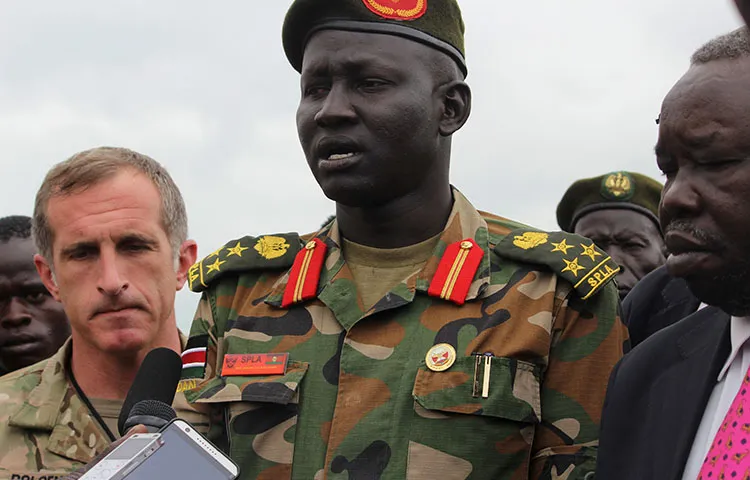Nairobi, August 29, 2017–The Committee to Protect Journalists is deeply troubled by reports that a South Sudanese army spokesman today denied that U.S. freelance reporter and photographer Christopher Allen, who was killed covering conflict there on August 26, was deserving of civilian status. CPJ called for an independent investigation into the circumstances surrounding Allen’s death, and urged authorities to respect all journalists’ status as civilians.
South Sudan’s army, a rebel spokesman, and the U.S. Embassy in the capital Juba confirmed to CPJ that Allen was killed during fighting between government and rebel forces in Kaya, near the borders with Uganda and the Democratic Republic of Congo. Allen had been embedded with opposition forces for two weeks, Col. Lam Paul Gabriel, the rebel’s deputy spokesman, told CPJ.
At a press conference today, South Sudan army spokesman Lul Ruai Koang said journalists who enter the country with rebel forces will not be protected, The Associated Press reported. “Anybody who comes attacking us with hostile forces will meet his fate,” Koang told journalists, according to AP.
“Taking photographs and reporting events is not attacking. It is journalistic work done by civilians, who are protected under international law,” said CPJ Africa Program Coordinator Angela Quintal in New York. “We call for a credible, independent investigation into the killing of Christopher Allen so that those responsible can be held to account.”
Gabriel, with the rebel forces, told CPJ that the South Sudanese military deliberately targeted Allen for taking pictures of the fighting, but he offered no evidence when asked to back up this claim. Gabriel said the rebels failed to recover his body because of heavy fire, but did get the journalist’s camera and bag.
In an interview with CPJ yesterday, Koang denied that the army deliberately targeted Allen.
Reuters on Saturday quoted a rebel fighter who said Allen was wearing a press jacket at the time of his death. CPJ was unable to independently confirm this.
According to AP, South Sudan’s chief army medical examiner, Peter Ajak Bullen, said Allen was shot in the head, though it was not clear if the bullet entered at close range.
Yesterday, South Sudan deputy army spokesman Col. Domic Chol Santo told CPJ that the army had no way of identifying Allen as a journalist until his body was recovered. He said the army was looking into Allen’s “illegal” entry into South Sudan. He also said the army had no immediate plans to investigate the killing.
Apart from confirming Allen’s death, the U.S. Embassy yesterday did not respond to any additional questions, including those on the repatriation of Allen’s body, and his migrant status in South Sudan. The embassy said it was still in the “process of obtaining all information related to this situation.”
A civil war has been raging in South Sudan since 2013, displacing millions, and leaving tens of thousands dead in its wake. In response to coverage of the fighting, authorities have closed and obstructed access to news outlets, arrested journalists, and expelled reporters, according to CPJ research.
